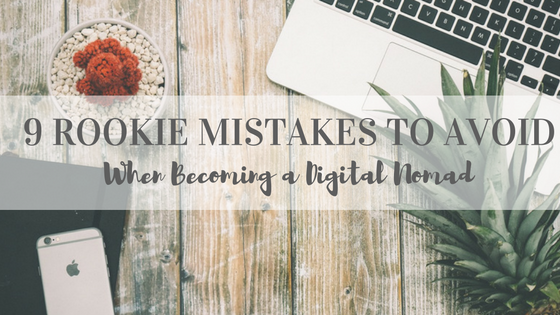9 'Rookie Mistakes' To Avoid When Becoming a Digital Nomad
/Experienced digital nomads share common mistakes they made when starting out
You can research 'How to Become a Digital Nomad' as much as you want, but sometimes experience is the best teacher. Myself, along with fellow experienced digital nomads, came together to share "rookies mistakes" that we made when starting out as a digital nomad, or mistakes that we see far too often among new digital nomads. Save time, money, and well stress by checking out the 9 rookie mistakes to avoid when becoming a digital nomad
#1 Thinking It's as Easy as the Instagram Photos
With those stunning photos taking over digital nomads Instagram accounts, it can appear that this lifestyle is easy, enjoyable, and beautiful at all times. In reality, there are a lot of challenges unique to digital nomad life. Some common challenges unique to the digital nomad lifestyle include:
- Loneliness: This is one of the most common and talked about challenges among digital nomads. Living such a unique lifestyle means that not many people will "get you", along with physically being alone at times when solo traveling
- Striking a Balance: It can be difficult balance everything, between work, travel, new friends, old friends, all while still exploring a new country.
- Stimulation Overload: At times it can feel overwhelming, always having to readjust to a new country, new food, new cultures, and new friends. It can sometimes feel like you're always "on", not having a chance to actually "mentally" rest.
- Normal Life Challenges: The challenges of everyday life don't stop just because you're traveling. Things will come up. You could lose a client or your job, who is essentially "paying your way", all the way to the extreme case of having to deal with death and loss.
- Missing Big Life Events: Missing friends weddings, the birth of new babies, nieces, or nephews - good news, bad news - you are often going to miss out on a lot of life events happening back home, or having to deal with situations and life events on your end without the support of home. Let me tell you, I would have paid ANY price to get back home when I was the sickest I have ever been in Japan but my new lifestyle simply didn't allow for it. Also, being in an earthquake all alone,can be quite the, "I'm going to die alone" experience.
#2 Not Setting Clear Goals and Deadlines
As a digital nomad, you'll be working remotely and are responsible for making the time to get things done. There's no one there to do it for you or to keep you accountable. You decide when you work, where you work and so on. With so much going on between exploring, making new friends and work, it's important to set clear goals and deadlines, otherwise, that free-spirit wanderlust can have you in a country for a month with nothing accomplished. Digital Nomad Kyle P advises newcomer digital nomads that, "Not setting clear goals and deadlines for what you want to accomplish each week and not having a productivity system" can be a bit mistake. Kyle finds that by using this approach of setting clear goals and deadlines, it makes everything more manageable and helps keep himself accountable.
#3 Starting to Travel Without Clients
A popular way for digital nomads to earn an income remotely is to start freelancing. Regardless of how qualified you are, building up your client list can take time. Start building your client list sooner, rather than later, especially before you take off on your big digital nomad adventure.
Christian O from Random Trip explains, "The biggest mistake [I made] was to start travelling without getting freelance clients first. I left my job and had one month and a half to prepare, leave my flat and two cats, say goodbye to friends and family, and to find an income source. However, I didn’t put much effort into [finding an income source], so I was suddenly in Southeast Asia spending money with no clients yet!" Luckily for Christian, after 2 months as a digital nomad, he managed to get his first client but that may not be the case for everyone.
You might also like: 'How to Calculate Your Freelance Rate' which includes a free 'Calculate your Freelance Rate Worksheet' so you can quickly and easily calculate your freelance rate.
#4 Undervaluing Your Work
Again, in the realm of freelancing, CupofTJ warns, "The worst thing you can do as a starting digital nomad, especially if you're a freelancer, is to undervalue your work and charge potential clients less money, thinking they'd hire you because you're cheaper. It'll be a difficult climb up from that low number you started for yourself and you'll feel frustrated performing an exceptional level of work for little pay. People also often associate 'cheap' with 'low quality'. Don't be afraid to charge your worth!"
#5 Not Packing 'Difficult to Get' Items
From a logistics and packing standpoint, it can be easy to think that you'll pack light and just buy what you need when you arrive at your destination. However, some things can be difficult to find abroad, or prices can be much more expensive than at "home". So, before you go, make sure you pack enough of the following:
- Western Size Clothing: In Vietnam I went shoe shopping, only to discover women's size 8 shoes aren't really a thing. Keep in mind, especially in Asia, that sizes can be much smaller. From clothing, shoes, bras... even diaper sizes can vary abroad!
- Back Up Debit and Credit Cards: At some point, your cards will probabaly get lost or stolen and when you don't have a backup, it can be a nightmare trying to access money. You have no idea how many times I've seen people return from a visit home to the USA with replacement debit and credit cards for a crew of digital nomads. Also keep in mind that not all countries are good at keeping mailing from "going missing", especially in South America.
- Certain Toiletries: All things aren't created equal and that's absolutely certain when it comes to toiletries abroad. Many digital nomads find products such as good deodorant, bug spray, contact lenses, contact solution, sunscreen and non-whitening skin moisturizer simply easier to just bring from home. Sometimes the quality could be different than you're used to which could lead to discomfort especially when it comes to contact lenses and bug spray.
- Feminine Products: Sometimes feminine products can be a hassle to find abroad, or instead of an array of options, you will be stuck with what that country has to offer. Pack extra or bring a menstrual cup to make sure you're covered.
- Medicine (over-the-counter) - When I was in Japan, Ibuprofen couldn't just be purchased at a 7 Eleven - news to me! When you're in dire need of Ibuprofen but can't access any because the pharmacy is closed until the next day, it's not a pleasant experience. It's always best to have any sort of medication such as allergy pills, Ibuprofen, Tums, and prescription medication on you, just in case. Note: some prescription drugs or over-the-counter medication can be illegal in other countries so do your research before you leave.
- International Driving Permit: This isn't always necessary but having an international driving permit could help you avoid some trouble, should something happen. When I say driving permit I think of scooters being a popular mode of transportation in many countries, although you'll want this if you rent a car for a weekend away as well. With corrupt police abroad, you can already be an easy target so don't make it more difficult for yourself by not having the proper documentation. It can be very easy to get intimated by officers when you aren't familiar with a countries rules but with an international driving permit, you'll at least know you're covered. P.S. there is a real chance you can get in a scooter accident in Thailand or Bali, not always major, but possible since the conditions are much different and there aren't always strict rules when it comes to wearing a helmet etc so always be proactive in staying safe.
#6 Not Realizing the Difference Between 'Internet' and 'Quality Internet'
A huge lesson I learned while working remotely in over 13 countries is that the internet quality various a lot around the world. If you find an Airbnb that says it has the internet, that doesn't always mean good quality or reliable internet. The internet could frequently drop off or be at such slow speeds you feel like you're back to dial up.
When I was in Japan, I also had a hotspot that would throttle after so much usage. Bandwidth throttling is when an internet provider intentional slows down your internet after so much usage. This is detrimental if you have a lot of video calling or video editing to do and to be honest, I didn't even realize there was such a thing until it happened to me.
To ensure you have good quality and reliable internet:
- Ask Around: Do a bit of digging before you leave and chat with experienced digital nomads to get tips on good spots to work.
- Get Speed Tests: Ask Airbnb's or hotels to send you speed tests, which they can easily do with this link before you arrive. This will let you know if the internet quality is good enough to work with. Need a comparison? Run one with your current internet speed and compare it with that they tell you. Note: A minimum for basic work would be around 4 Mbps Upload/Download speed, whereas of course, developers need much higher quality internet.
- Hotspot Backup: Always have a hotspot to tether too as a backup, should something happen with your main source of internet. Note: sometimes if you can't get service somewhere, the hotspot might not work.
- Co-working Spaces: Your safest bet for quality and reliable internet is to work from a local co-working space. If you're not familiar with co-working spaces, check out this video of one of my favourite coworking spaces in Buenos Aires, Argentina - La Maquinita.
#7 Not Being Intentional With Your Time
Similar to above, it's important to, "Intentionally create space for work, travel, vacation and just plain downtime and to do it in a way that allows for a rich and complete experience of each" Iaian B from Cast Away Life advises. Instead of "a big ball of mud" or "life smoothie" as Iaian refers to it, intentionally give each item the time it deserves.
And yes, you read that right - make time for vacations. As a digital nomad, you'll be working a lot and sometimes you'll need a break from work just like everyone else. It can often be hard for digital nomads to "take a vacation" but recognize just because you're in a beautiful location doesn't mean you don't deserve or need a break from work.
#8 Being too Hard on Yourself
And when you're just starting out, "You have to allow yourself time to get acclimated. It's a new lifestyle! Don't be too hard on yourself - you'll get into your groove eventually!" Go at your own pace and do what works for you, it's meant to be an enjoyable experience after all." Alyne T explains.
#9 Not Doing What Works For You
Everyone will experience this digital nomad lifestyle in their own unique way and it's important to stay true to who you are and what you want. Vlogger Eddie Contento explains, "If you're a traveling digital nomad out to see the world, don't let others opinions of a city, country, or culture sway you too much. I've found my experiences are often different than the stories that I'm told. If you're thinking about visiting someplace, go for it. Live there. Experience something new. Gain your own perspective on it."
As a digital nomad you are about to grow, learn and shape yourself in ways you've never imaged and your new lifestyle is sure to be a one-of-a-kind adventure. Enjoy yourself and remember, "Travel isn't a reward for working, it's an education for living."
What do you think of these rookie mistakes? Let me know in the comments below!
Follow the Digital Nomad Journey





